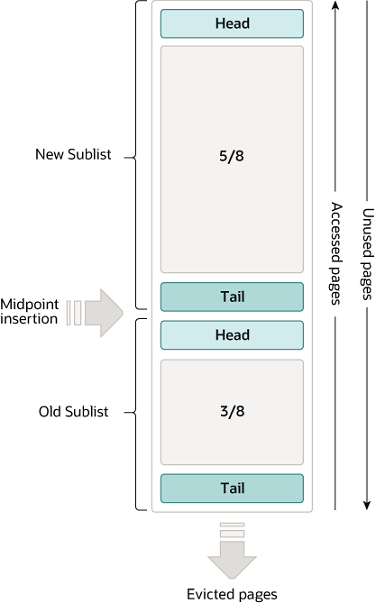The buffer pool in MySQL/InnoDB is managed as a list using a variation of the least recently used (LRU) algorithm. When room is needed to add a new page to the buffer pool, the least recently used page is evicted and a new page is added to the middle of the list (not the head of the list). It has two sublists:
- New sublist: At the head, a sublist of new pages that were accessed recently
- Old sublist: At the tail, a sublist of old pages that were accessed less recently
By default, the algorithm operates as follows:
-
When InnoDB reads a page into the buffer pool, it initially inserts it at the midpoint (the head of the old sublist).
-
Page hits in the:
Old sublistmake pages young, moving it to the head of the new sublist (except read-ahead operations)- If the delay defined by
innodb_old_blocks_timenot being met, page accesses do not result in making pages young
- If the delay defined by
New sublistmove pages to the head of the new sublist only if they are a certain distance from the head
-
As the database operates, pages in the buffer pool that are not accessed age by moving toward the tail of the list. Eventually, a page that remains unused reaches the tail of the old sublist and is evicted.
Specifies how long in milliseconds a block inserted into the old sublist must stay there after its first access before it can be moved to the new sublist:
- The default value: 1000
- The value 0: A block inserted into the old sublist moves immediately to the new sublist the first time it is accessed
- The value > 0: Blocks remain in the old sublist until an access occurs at least that many milliseconds after the first access
- Non-zero values protect against the buffer pool being filled by data that is referenced only for a brief period, such as during a full table scan
Specifies the approximate percentage of the InnoDB buffer pool used for the old block sublist:
- The range of values: 5 to 95
- The default value: 37 (that is, 3/8 of the pool)
